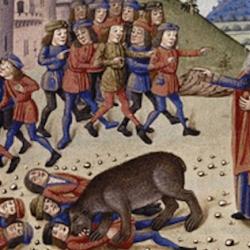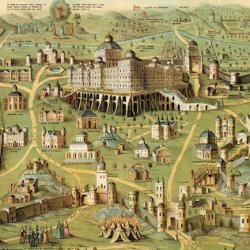INTRODUCTION
When Israel is pursuing Canaanite worship and culture with full force, Yahweh acts. Elijah, a new Moses, bursts into Israel?s history and single-handedly leads the people to renew the covenant they had made at Sinai (1 Kings 17-19). Then Elisha, a new Joshua, leads a reconquest of the land and ministers to a remnant known as ?sons of the prophets?E(2 Kings 1-5). In Israel?s darkest time, Yahweh lights a lamp.
THE TEXT
?And Elijah the Tishbite, of the inhabitants of Gilead, said to Ahab, ?As the LORD God of Israel lives, before whom I stand, there shall not be dew nor rain these years, except at my word.?EThen the word of the LORD came to him, saying, ?Get away from here and turn eastward, and hide by the Brook Cherith, which flows into the Jordan . . . .?? (1 Kings 17:1-24).
STRUCTURE
Chapters 17-18 go together, framed by the beginning of the drought (17:1) and its end (18:41-46). All the events between have some connection with the drought. The two chapters are written in parallel:
Chapter 17 Chapter 18
A. No rain, v 1 A?E Promise of rain, v 1
B. Ravens provide bread, vv 2-7 B?E Obadiah and Ahab, vv 2-6
C. Meeting and test of Widow, vv 8-16 C?E Obadiah and Elijah, vv 7-15
D. Death and resurrection, vv 17-24 D?E contest of gods, 16-46
In the two ?A?Esection, Elijah and Ahab are mentioned, and both make reference to ?years.?EThe ?B?Esections are united by the need water, the provision of bread and water (by ravens and by Obadiah), and by the word ?cut?E(the name of the brook ?Cherith?Eand Jezebel?s ?cutting off?Eof prophets). In the ?C?Esections, Elijah meets someone out on a search, Elijah gives instructions to both, and both obey. In the ?D?Esections, there is a theme of renewal, the use of ?threes?E(17:21, 18:33-34), and prayers of Elijah (17:20-21; 18:36-37). Both events end with a confession of faith in Yahweh. This last parallel suggests that the contest at Mount Carmel is a kind of resurrection for Israel. This also shows that Elijah?s ministry to the widow at Zarephath is not an abandonment of Israel. It is preparation for Israel?s renewal.
ELIJAH, THE TISHBITE
Like the man of God in chapter 13, Elijah enters into history suddenly, without warning. He is introduced as a ?Tishbite?E(v. 1), which is related to the word for ?settler,?Eand may indicate that Elijah was a sojourner rather than a permanent resident of Gilead (cf. Leviticus 25:6, 35, 45, 47). He?s apparently a social outsider, as well as a religious outsider.
Yahweh is directly challenging Baal, a sky god believed to control the weather and grant fertility. Yahweh shows who?s really in charge of the rain, humiliating the gods of Ahab as He humiliated the gods of Egypt. Elijah claims to have power to stop the rain: ?there shall be neither dew nor rain these years, except by my word?E(v. 1). Of course, his power ultimately comes from the Word of Yahweh, but the word of Elijah is also effective (vv. 15, 22). This is the first indication of many in the Elijah-Elisha stories that the Word of Yahweh so indwells the prophets that their words and actions carry Spiritual power. Even their bodies communicate life and health: Later in chapter 17, Elijah?s body gives life to a dead child (vv. 21-22), and Elisha does the same (2 Kings 4:34-35).
By Elijah?s word, there is no dew or rain for ?three years?E(18:1). Sinful as Ahab is, the judgment against his house is curtailed. It is not a complete ?seven-year?Ejudgment, but a partial ?three-year judgment.?EGod breaks into the middle of the week of Ahab?s reign to show mercy.
DURING THE DROUGHT
This chapter records three incidents in Elijah?s ministry. The drought is a threat to life, and all the miracles in chapter 17 show that Yahweh preserves His prophet and His remnant in the midst of this threat. First, Yahweh sends him to the brook ?Cherith,?Ewhere he is sustained by food brought by ravens. He is east of the land, in exile from the presence of God (cf. Genesis 3), and He is fed by unclean birds, which represent Gentiles. Like Israel in the wilderness, Elijah receives miraculous provision of bread and water (cf. Exodus 16:8, 12). The reference to ?morning and evening?Ein verse 6 suggests a sacrificial setting. Hold that thought.
Second, when the brook dries up, Elijah goes off to Zarephath, in the region of Sidon (v. 9), the hometown of Jezebel (16:31). Like the ravens, the Gentile widow miraculously provides Yahweh?s prophet with food and water (compare vv. 4, 9). Again, there is a sacrificial theme here, in that the woman gives her last cake to Elijah, trusting his promise that there will be some leftover. Gentiles benefit from the presence of the prophet when Israel provokes Yahweh to jealousy (Deuteronomy 32:21-22). Elijah?s request for water is also reminiscent of the many scenes of men and women at wells, and introduces a marital theme into the story. Though Elijah does not marry the widow, of course, he does restore her son to her and he gives her provision and protection. Representing the Divine Husband, Elijah serves as a husband to the Gentile widow.
Third, when the widow?s son dies, Elijah raises him from the dead, the first literal death and resurrection in Scripture. It is also a Passover scene. The only son of a widow is threatened with death, and actually dies, but is delivered through the power of Yahweh?s prophet and His Word. Elijah?s prayer echoes the accusation of the widow (vv. 18, 20). Remarkably, Yahweh responds to Elijah?s prayer. Elijah?s word is not only effective in stopping the rain; it is effective with Yahweh. ?The effectual, fervent prayer of a righteous man accomplishes much?E(James 5:16-17).















